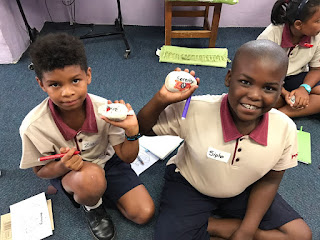 |
| Matt uses his iPad during class every day |
In Time magazine of 7 November 2016, there was
an interesting parenting article that confronts our current knowledge about the
positive and negative affects of young children using technology. The American
Academy of Pediatrics used to warn that any amount of time spent on technology,
even educational apps, would lead to poor reading, or bad language skills. They
have recently changed their stance against screen time, and instead published
some pointers to help parents. The article really made sense so I decided to
share some of their thoughts on how to help your children have a better
relationship with technology.
Firstly, Dr David Hill, spokesperson for the AAP’s
Council on Communications and Media, says that babies as young as 18 months get
great pleasure from technology that connects them to people. Therefore when one
parent is away on business, or grandparents live far away, a good idea is to
use videochat for them to connect with the absent family. Not mentioned in the
article but something I have seen used very effectively for a similar reason,
is to load family photographs onto an unused cellphone and give it to the young
child. Particularly when photographs include those of the child themselves,
this entertains the child for a long while, reinforces family bonds and memories.
 |
| Ethan and mom, Rose, working on the library computer |
The second suggestion Dr Hill has is that
parents should watch good programmes with their children between the ages of 2
and 5. If the parent engages with the child while watching good content on a
podcast, the learning, which results from this, can be used everywhere else.
Thirdly he warns parents that they should make
sure they know what their older children are watching. He reminds us again that
we need to ensure that programmes with violence or explicit sex are not
available to children of any age because they learn from what they see.
 |
| Finn researching for a school project |
‘Be a good example yourself’, he reminds us!
So, turn off your phone at certain times, don't leave the television on
continually and watch good content. He also reminds us to lead by example when
operating on social media – if our children see us insulting someone online
they will think that that’s acceptable behaviour. This point reminds me that we
should also ensure that we show our children that we can manage without
technology while on holiday for instance. Read your own paper novels as well as
literature found on your Kindle, too.
Finally he asks that we keep open minds and be
sensible about limiting screen time, and allowing children to engage with the
right content. If these points are born in mind, no technology will damage your
child in their formative years.





